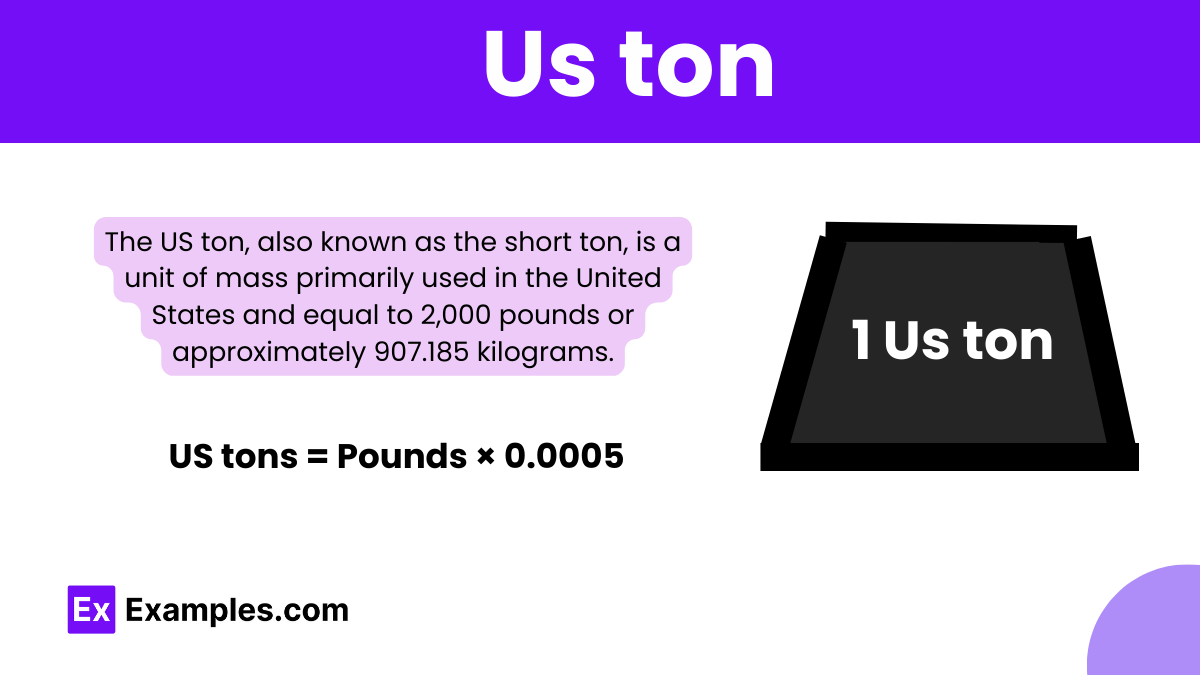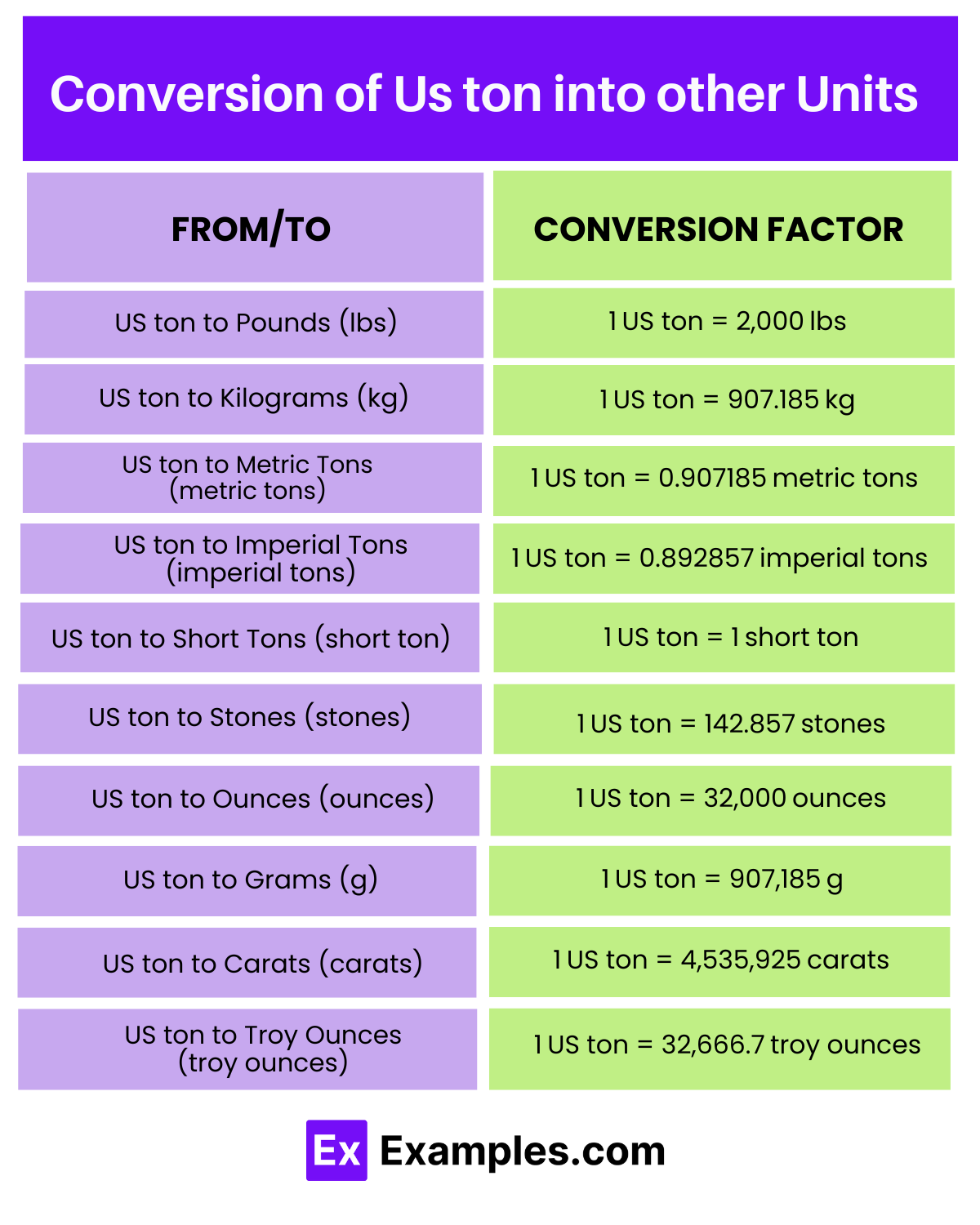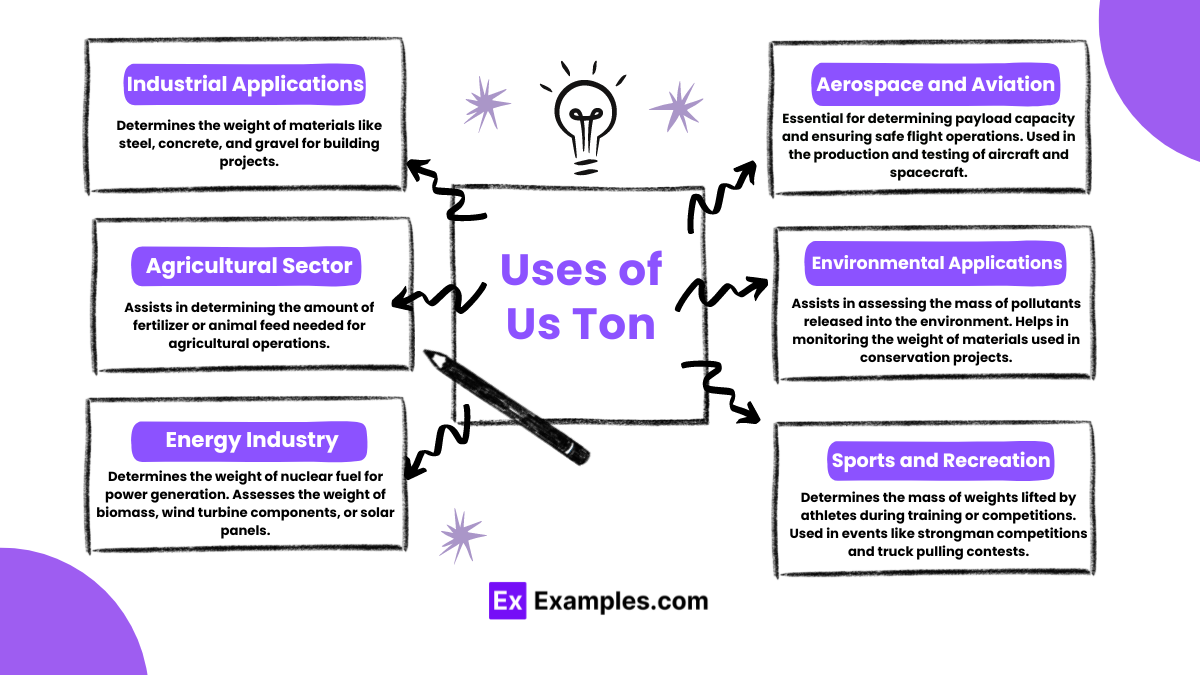How many pounds are in one US ton?
1000 pounds
1500 pounds
2000 pounds
2500 pounds


US tons = Pounds × 0.0005
To convert from US tons to pounds:
| Prefix | Multiple | Symbol | Value |
|---|---|---|---|
| kilo- | Kilotons | kt | 1 kt=1,000 US tons |
| mega- | Megatons | Mt | 1 Mt=1,000,000 US tons |
| giga- | Gigatons | Gt | 1 Gt=1,000,000,000 US tons |
| Tera- | Teratons | Tt | 1 Tt=10¹² US tons |
| Peta- | Petatons | Pt | 1 Pt=10¹⁵ US tons |
| Exa- | Exatons | Et | 1 Et=10¹⁸ US tons |
| Zetta- | Zettatons | Zt | 1 Zt=10²¹ US tons |

| From/To | Conversion Factor | Example |
|---|---|---|
| US ton to Pounds (lbs) | 1 US ton = 2,000 lbs | 10 US tons = 20,000 lbs |
| US ton to Kilograms (kg) | 1 US ton = 907.185 kg | 10 US tons = 9,071.85 kg |
| US ton to Metric Tons (metric tons) | 1 US ton = 0.907185 metric tons | 10 US tons = 9.07185 metric tons |
| US ton to Imperial Tons (imperial tons) | 1 US ton = 0.892857 imperial tons | 10 US tons = 8.92857 imperial tons |
| US ton to Short Tons (short ton) | 1 US ton = 1 short ton | 10 US tons = 10 short tons |
| US ton to Stones (stones) | 1 US ton = 142.857 stones | 10 US tons = 1,428.57 stones |
| US ton to Ounces (ounces) | 1 US ton = 32,000 ounces | 10 US tons = 320,000 ounces |
| US ton to Grams (g) | 1 US ton = 907,185 g | 10 US tons = 9,071,850 g |
| US ton to Carats (carats) | 1 US ton = 4,535,925 carats | 10 US tons = 45,359,250 carats |
| US ton to Troy Ounces (troy ounces) | 1 US ton = 32,666.7 troy ounces | 10 US tons = 326,667 troy ounces |
US tons are commonly converted to pounds, with each US ton equivalent to 2,000 pounds. This conversion is frequently encountered in shipping and industrial contexts for estimating package weights and cargo loads.
Kilograms are a widely used metric unit for measuring mass, and US tons can be converted to kilograms using a conversion factor of approximately 907.185 kilograms per US ton. This conversion is important for international trade and scientific calculations.
Metric tons, also known as tonnes, are used in many countries as the standard unit for large masses. The conversion from US tons to metric tons involves multiplying the US ton value by 0.907185, providing an equivalent mass in metric tons.
Imperial tons, also known as long tons, are a unit of mass used in the British Imperial system. The conversion factor from US tons to imperial tons is approximately 0.892857, indicating that one US ton is slightly less than one imperial ton.
In the United States, the short ton is commonly used in commerce and industry. A US ton is equivalent to one short ton, making conversion between the two units straightforward and frequently encountered in American trade and transportation.
Stones are a traditional unit of mass used in some contexts, particularly in the United Kingdom for measuring body weight. One US ton is equivalent to approximately 142.857 stones, although this unit is less commonly used in modern applications.
Avoirdupois ounces are the standard units of mass used in most everyday situations. Converting US tons to ounces involves a large multiplier, with one US ton equal to 32,000 ounces. This conversion may be relevant in specialized fields such as materials science or food packaging.
Grams are the basic unit of mass in the metric system and are widely used in scientific and laboratory settings. Converting US tons to grams involves a large multiplication factor, with one US ton equal to approximately 907,185 grams.
Carats are a unit of mass commonly used to measure the weight of gemstones and pearls. One carat is equal to 0.0002 US tons, making conversions from US tons to carats involve large numbers, especially in the context of mining and jewelry.
Troy ounces are used primarily in the precious metals industry, particularly for measuring the weight of gold, silver, and other precious metals. Converting from US tons to troy ounces involves a large multiplication factor, with one US ton equivalent to approximately 32,666.7 troy ounces.
In the shipping industry, US tons play a crucial role in determining cargo loads and freight capacity aboard vessels. For instance, when transporting bulk commodities such as coal or grain, shipping companies calculate the total weight in US tons to ensure vessels are not overloaded and comply with safety regulations. Additionally, in construction projects, materials like gravel, sand, and concrete are often measured in US tons to estimate quantities needed for building foundations, roads, and infrastructure. Moreover, in the mining sector, US tons are used to quantify the mass of extracted minerals and ores, facilitating efficient logistics and resource management. Overall, the versatility and standardized nature of US tons make them indispensable in various industries for accurate measurement and efficient transportation of goods.

A US ton, also known as a short ton, is a unit of mass commonly used in the United States. It differs from other tons, such as the long ton (imperial ton) and metric ton, in its conversion factor and usage.
Yes, there are differences. While both are units of mass, the US ton is equivalent to 2,000 pounds, whereas the metric ton (tonne) is equal to 1,000 kilograms or approximately 2,204.62 pounds.
US tons are extensively used in industries such as shipping, construction, mining, and manufacturing for measuring large masses of goods, materials, and commodities.
Text prompt
Add Tone
10 Examples of Public speaking
20 Examples of Gas lighting
How many pounds are in one US ton?
1000 pounds
1500 pounds
2000 pounds
2500 pounds
Convert 3 US tons to pounds.
3000 pounds
6000 pounds
9000 pounds
12000 pounds
How many US tons are there in 8000 pounds?
2 US tons
3 US tons
4 US tons
5 US tons
Which unit is larger, a US ton or a metric ton?
US ton
Metric ton
They are equal
It depends on the context
Convert 2.5 US tons to kilograms (1 pound = 0.453592 kg).
1000 kg
1500 kg
2000 kg
2268 kg
How many US tons are equivalent to 10000 pounds?
4 US tons
5 US tons
6 US tons
7 US tons
If a truck can carry a maximum load of 5 US tons, how many pounds can it carry?
5000 pounds
10000 pounds
15000 pounds
20000 pounds
How many US tons are there in 5000 kilograms (1 kg = 2.20462 pounds)?
2 US tons
2.5 US tons
3 US tons
5 US tons
What is the weight of 7 US tons in pounds?
7000 pounds
12000 pounds
14000 pounds
21000 pounds
Convert 1.5 US tons to kilograms.
680.39 kg
907.18 kg
1000.50 kg
1500.25 kg
Before you leave, take our quick quiz to enhance your learning!

